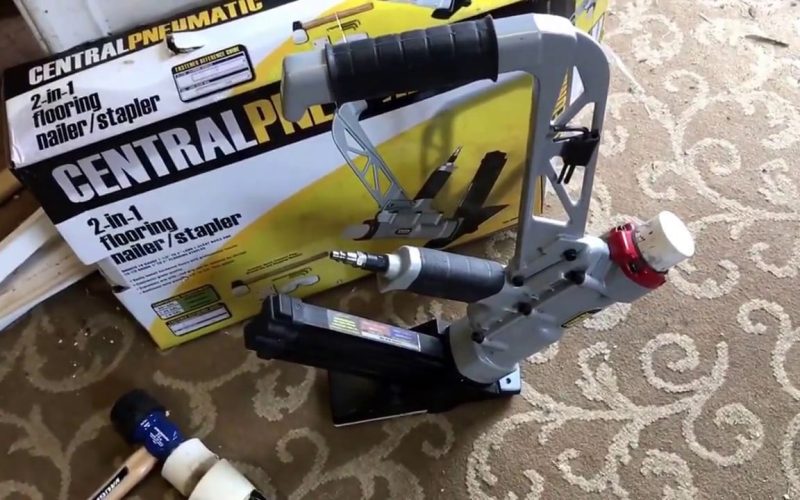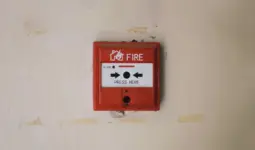Flooring nailers are essential for installing hardwood floors quickly and efficiently.
They drive nails or staples into the flooring at the proper angle, ensuring a secure and tight fit.
Anyone from DIY enthusiasts to professional contractors can benefit from using a flooring nailer to get the job done right.
Several types of flooring nailers exist, including manual, pneumatic, and electric models.
Manual nailers require more physical effort, while pneumatic ones use compressed air to do the work, making the task much easier.
Electric nailers offer convenience without the need for an air compressor. Choosing the right type depends on your needs and budget.
When purchasing a flooring nailer, a few factors are critical. The weight and ergonomics of the tool can affect how comfortable it is to use over long periods.
The type of fasteners it uses and the flooring width it supports are also important.
Durability and ease of maintenance can save you time and money in the long run.
We tested and researched various models to identify the best flooring nailers for your projects.
Best Flooring Nailers
Let’s dive into our top picks for flooring nailers. These tools offer reliability and efficiency, making your flooring projects a breeze.
WEN 4-in-1 Flooring Nailer

This tool is a solid choice for someone looking for versatility and ease of use in their flooring projects.
Pros
- Multi-functionality for various jobs
- Easy to clear jams
- Lightweight design with comfortable grip
Cons
- Can have issues with base plate adjustment
- Not ideal for heavy-duty use
- Air compressor required
We’ve enjoyed using the WEN 4-in-1 Flooring Nailer, which truly shines in its versatility.
It easily transitions between a brad nailer, stapler, and flooring gun. Working with different types of fasteners is a breeze.
The adjustable spring-loaded head makes it adaptable for different angles, perfect for carpentry tasks.
One aspect we appreciate is how light the tool feels during prolonged use.
The rubber-backed grip helps keep hand fatigue at bay, and the quick-release nose ensures we don’t spend too much time dealing with jams. These features make our projects run smoother and more efficiently.
While this tool has great aspects, we noticed some minor drawbacks.
The base plate adjustment can sometimes be finicky and may come loose.
Also, it’s not the best for heavy-duty jobs, but it’s reliable for small to medium tasks.
This WEN nailer is a fantastic option for those needing a versatile tool that handles various flooring tasks.
NuMax 3-in-1 Flooring Nailer

This flooring nailer is a fantastic option for DIYers and professionals.
Pros
- Versatile 3-in-1 design
- Sturdy and lightweight
- Easy to handle with an ergonomic grip
Cons
- Requires an air compressor
- Not ideal for tight corners
- Occasional jamming issues
We’ve just wrapped up using the NuMax 3-in-1 Flooring Nailer on a new hardwood floor project, and it’s been quite an experience.
The tool’s versatility shines with its ability to switch between nailing and stapling, which saves a lot of time and hassle.
The lightweight aluminum body and comfortable ergonomic handle reduced our fatigue during long work hours.
This tool didn’t feel bulky at all and was easy to maneuver around the floor. Additionally, the no-mar base plates were great; they didn’t scratch our finished floors.
This pneumatic nailer requires an air compressor, which might not be everyone’s cup of tea.
Also, getting close to walls can be tricky; sometimes, we face minor jamming.
Despite that, it’s a solid and valuable addition for anyone looking to undertake a flooring project themselves.
Bostitch 2-in-1 Flooring Tool

Whether you’re a professional or a DIYer, the Bostitch 2-in-1 Flooring Tool is a reliable and user-friendly option for your flooring needs.
Pros
- Lightweight design, only 10.2 lbs
- Comfortable long handle with rubber grip
- Versatile with interchangeable base plates
Cons
- Occasional jamming issues
- Requires two-handed operation
- Not the best for tight spots
We love the Bostitch 2-in-1 Flooring Tool for its lightweight and robust build.
The long handle and rubber grip make it a pleasure to use, even for extended periods. Although it’s light, it’s still incredibly sturdy and feels durable.
The versatility of the interchangeable base plates is another highlight.
This feature easily adapts to different flooring thicknesses, saving time and effort during the installation process.
We’ve used it to install various types of flooring, and it handled each job seamlessly.
However, users might face occasional jamming, which can be a bit frustrating.
Also, its design means it requires two hands to operate – one to hold and the other to strike with the mallet.
This can be uncomfortable if you’re used to single-handed tools. Additionally, it can be awkward to maneuver in tight spots.
Overall, the Bostitch 2-in-1 Flooring Tool is a solid choice if you’re looking for a combination of comfort, versatility, and reliability for your flooring projects.
Freeman PDX50C Lightweight Pneumatic Flooring Nailer

This nailer is a fantastic choice for anyone needing a reliable tool for hardwood flooring projects.
Pros
- Easy to handle due to its lightweight
- Compatible with various fasteners
- Includes useful accessories like a fiberglass mallet
Cons
- Occasional jams during use
- May slip off the edge if not aligned properly
- Requires an air compressor, which isn’t included
Using the Freeman PDX50C was a breeze because of its light weight. This meant we could work for hours without feeling fatigued.
Switching between T-cleats, L-cleats, and staples was simple, adding flexibility to our project.
The interchangeable base plates were handy, allowing us to work on different floor thicknesses efficiently.
The no-mar design protected our finished flooring, which we appreciated.
We also loved how it came with everything we needed, from the fiberglass mallet to the adjustment tools.
There were a few jams, which was a bit frustrating. We noticed it occasionally slid off the edge of the flooring, so we had to pay close attention while working.
Lastly, make sure to have a good air compressor ready, as it’s not included in the package.
Overall, the Freeman PDX50C is a solid tool that delivers great value for flooring tasks.
Freeman PFL618C Flooring Nailer

This flooring nailer is a solid choice for DIYers and professionals with its versatility and ease of use.
Pros
- Lightweight
- Durable construction
- Interchangeable base plates
Cons
- Requires compressor
- Possible jamming issues
- Not suitable for all flooring types
We recently put the Freeman PFL618C to the test while installing new hardwood floors in our living room.
The lightweight body made it easy to handle, even during long hours of work.
We appreciated its sturdy aluminum build, which felt reliable and strong.
The nailer offered versatility with its compatibility with different gauge nails and staples.
We switched base plates easily, which helped prevent damage to our floors. This feature alone saved us a lot of time and stress.
An issue we encountered was needing to have a compressor handy, which might be inconvenient for some users.
There were occasional jams, but the quick-release feature allowed us to get back to work quickly.
Overall, this tool provided excellent results and made our flooring project smoother and less tiring.
The ergonomic handle minimized fatigue, and the included mallet was a nice addition to the package.
Buying Guide
Nail Size
We should check if the nailer supports the right nail size for our flooring project. Most flooring nailers use 16-gauge or 18-gauge nails.
The length of the nails, usually 1.5 to 2 inches, also matters. Matching the nail size with your floor thickness ensures a secure hold.
Magazine Capacity
A larger magazine means fewer reloads. This saves us time during installation. Look for a nailer that holds at least 100 nails. This feature is especially helpful for big projects.
Power Source
Flooring nailers can be manual, pneumatic, or electric. Manual nailers require physical effort, while pneumatic nailers use compressed air for more power.
Electric nailers offer convenience with battery or corded options. Our choice depends on project size and preference for ease of use.
Weight and Ergonomics
A lightweight nailer reduces fatigue. Consider a nailer under 10 pounds for comfort. Ergonomic handles with rubber grips also help prevent hand strain during long hours of work.
Adjustable Depth
Having adjustable depth control lets us set the nail depth precisely. This prevents damage to the flooring and ensures nails sit flush or just below the surface. Look for nailers with easy-to-use depth settings.
Price and Warranty
Price matters, but so does value. Compare features and read reviews to ensure we get the best bang for our buck.
A good warranty protects our investment. Most nailers come with at least a one-year warranty, but some offer up to five years.
Safety Features
Safety should be a top priority. Look for nailers with trigger locks and anti-dry fire mechanisms to prevent accidental firing and damage. These features protect us and keep our tools in good condition.







